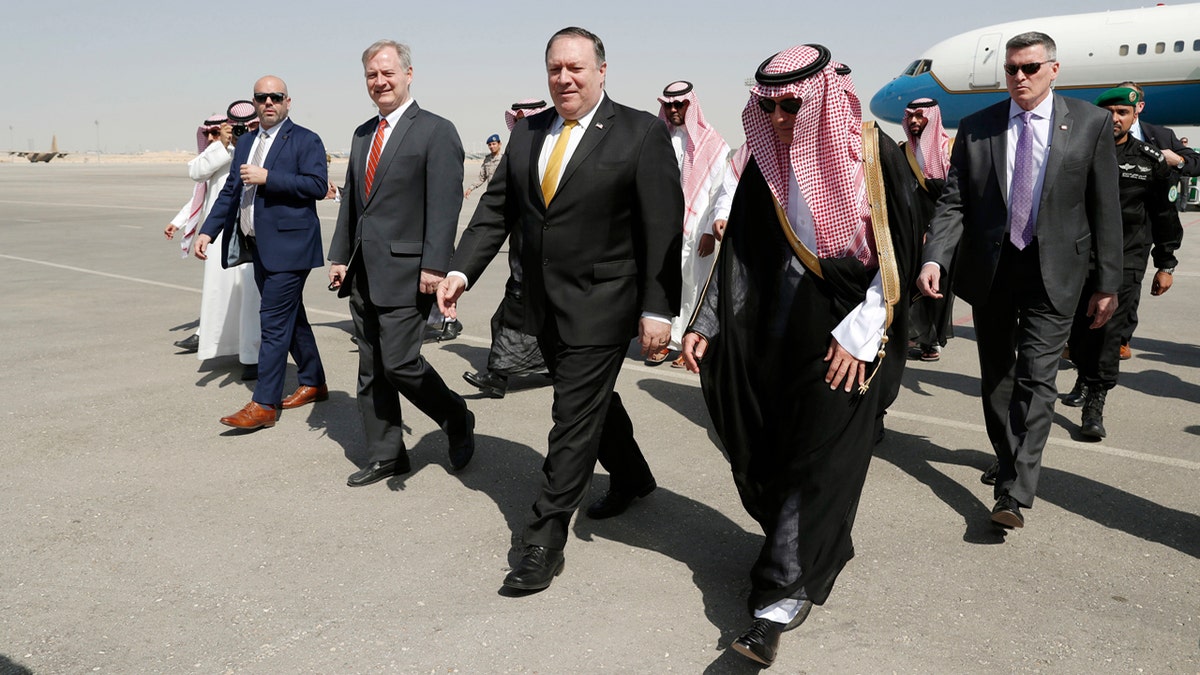
U.S. Secretary of State Mike Pompeo, second right in front, walks with Saudi Foreign Minister Adel al-Jubeir after arriving in Riyadh, Saudi Arabia, Tuesday, Oct. 16, 2018. (Leah Millis/Pool Photo via AP)
It’s time to rethink America’s relationship with the Saudi Kingdom.
It is no surprise to most Americans that we help arm, train, equip and otherwise prop up the government of Saudi Arabia. The Saudis have long bought and paid for many politicians and for an image of moderate pro-Americanism as part of the face they show the world.
But the face presented simply is not reality. It is time to use our leverage to force change in the Kingdom of Saudi Arabia. We can start by cutting off our military aid and weapons sales to the kingdom.
The killing of Saudi dissident journalist Jamal Khashoggi is many things, including brutal and terrifying to those who report on the Saudis. What it also should be, in light of what it exposes about the Saudi regime, is a turning point in our relationship, where we as Americans stop and ask ourselves what we have been propping up and supporting.
The fate of Khashoggi might come as a shock to many Americans, but it’s nothing new. A U.N. report reveals that over “3,000 allegations of torture were formally recorded” against Saudi Arabia between 2009 to 2015, according to The Guardian, with the report also noting a lack of a single prosecution of an official for the conduct.
I have been attempting to expose this for many years. Others in the U.S. government know it, but either won’t admit it or attempt to brush it aside. It’s a fact that the Kingdom of Saudi Arabia is the largest sponsor of radical Islam on the planet, and no other nation is even close.
Since the 1980s, over $100 billion has “been spent on exporting” Wahhabism (the brand of Islam that controls Saudi Arabia and is most prevalent in madrassas). According to Foreign Policy Magazine, an “estimated 10 to 15 percent of madrassas are affiliated with extremist religious or political groups,” while the number of madrassas in places like Pakistan and India has increased exponentially – from barely 200 to over 40,000 just in Pakistan.
Even the State Department noted during the Obama administration that Saudi Arabia was the “most significant source of funding to Sunni terrorist groups worldwide,” and said Qatar and Saudi Arabia were “providing clandestine financial and logistic support to ISIL and other radical Sunni groups.”
Of course, this isn’t new, as the previously classified 28 pages of the 9/11 Commission report can also tell you.
The Saudis have exported this radical ideology worldwide. They have also committed war crimes in their Yemen war – a war for which American taxpayers are being used as unwitting accomplices.
The Yemen war, fought with American weapons and logistical support, has killed tens of thousands and, according to The Washington Post, left 8 million more “on the brink of famine,” in what it calls “the world’s worst humanitarian crisis.”
The Saudi blockade of Yemen is a large contributor. Yemen now faces what the Post also notes is “the worst cholera epidemic in history, with more than 1 million people infected.”
Additionally, a U.N. report released Thursday states that 20 percent of civilian deaths caused by the Saudi coalition in this war are children.
Saudi Arabia also has a long record of human rights abuses, and its mistreatment of women is a matter of clear public record. But much more continues than is commonly spoken about.
According to Human Rights Watch, of over 5,000 detainees reported in a Saudi government database, over 3,300 have been held for more than six months “without a conviction or their ‘case file under judicial review,’ including 2,949 for more than a year and 770 for over three years.”
This is a regime that also rounded up and detained 500 people in a single weekend last November on allegations of “corruption.”
There is ample evidence of mass incarceration, indefinite detention, torture, and a complete lack of the rule of law and due process within Saudi Arabia. As a matter of understatement, this is antithetical to American ideals.
So what now? What do we do with this politically important country that clearly is not acting in the best interest of the U.S. or its own citizens?
Well, we can start by cutting the Saudis off. We should not send one more dime, one more soldier, one more adviser, or one more arms deal to the kingdom.
There are those who look at this option and say: “Well, what about our jobs, and won’t someone else sell the Saudis weapons?”
First, let me start with saying that is not a good enough reason to prop up the outright evil being perpetrated by the Saudis. But even accepting that, it is laughable to think that the kingdom, which has long been reliant on and trained on American military equipment, can suddenly change course.
What we have here is leverage. The Saudis need our help and weapons. And we should make sure that this need causes a change in their behavior.
It isn’t enough to talk tough and then give the Saudis what they want. We have to force their hand into real reforms, internally and abroad.
With the outrage caused by their recent actions, now is the time for bipartisan corrective action.
